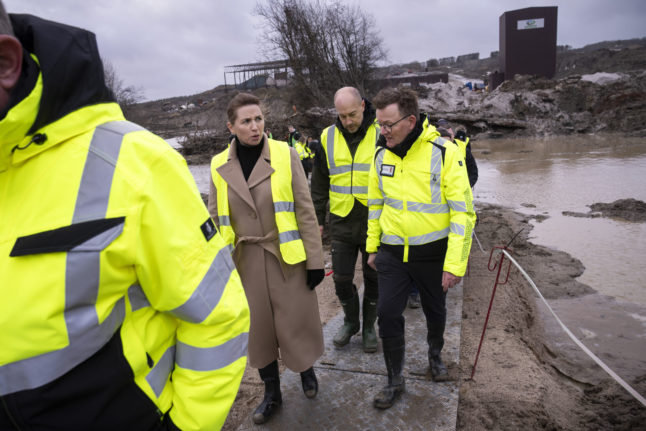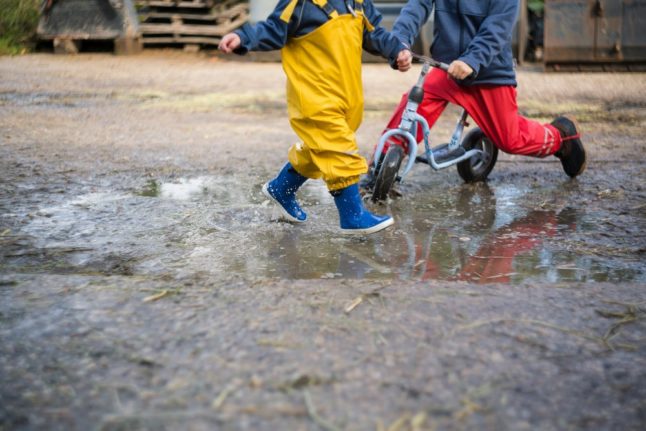In December, a major landslide at soil treatment company Nordic Waste’s facility at Ølst near Jutland town Randers meant that there was a risk of soil cascading onto the road.
“There is a danger that the amount of soil, which was being treated inside the facilities of Nordic Waste is moving through some of their buildings and out onto the motorway,” Rene Ludvig of East Jutland Police said at the time, adding that the situation was “critical”.
Those concerns later spread to potential pollution of the nearby river Alling Å.
“This situation is very serious. There’s all this polluted soil we have here which we’re worried about and which we are fighting to keep out of the clean water that flows into Randers Fjord,” environment minister Magnus Heunicke told broadcaster DR.
“It would be a catastrophe if the contaminated soil and water are mixed,” he said.
The minister, along with local residents and scientists have been concerned over the potential consequences of the landslide since it happened in December.
What is Nordic Waste?
The company processes (or processed) polluted soil from industry. Its majority shareholder is Danish billionaire Torben Østergaard-Nielsen.
Large amounts of polluted earth are piled up at its Ølst facility. The December landslide – caused by one of the many bouts of extreme weather seen in Denmark this winter – set in motion some 2 million tonnes of earth towards Alling Å river, which flows into Randers fjord as well as the sea.
Why is the situation so serious?
If the contaminated soil reaches Alling Å, the local aquatic ecosystem including Grund Fjord, Randers Fjord and the Kattegat sea could become polluted. This could harm wildlife in the waters and in the local landscape.
“If this ends up in Alling Å, the contamination will be moved on through the system and kill all the wildlife. Additionally, it would end up in Grund Fjord, Randers Fjord and eventually Kattegat,” Aalborg University biologist Kim Pless-Schmidt told DR.
What is being done?
On December 17th, the company recognised the potential environmental consequences of the situation and handed the plant over to Randers Municipality.
The local authority then began working overtime to prevent the earth from sliding into the river.
Earlier in January, plan was put in place to move some 8,000 tonnes of ‘mildly polluted’ earth from the Ølst facility to a former landfill at Fasterholt near Herning, in order to ward off the environmental damage as more heavy snow worsened the situation.
Why is the government involved?
After Nordic Waste declared bankruptcy on January 19th, the government said it would pursue “all judicial options” to prevent the cost of the environmental cleanup from being passed on to taxpayers.
Nordic Waste had previously been liable for moving the contaminated earth out of the area, as well as the other measures needed to prevent environmental damage.
Heunicke said that the government would take any legal action necessary to make sure “a large part of the bill” for the damage control work lands with the polluter, meaning Nordic Waste.
Justice Minister Peter Hummelgaard however said there was a risk that taxpayers could end up paying for the damage.
“We can’t stand here today and issue any guarantees,” Hummelgaard said.
READ ALSO: Danish government poised for legal pursuit of landslide waste company
Why is the billionaire owner of Nordic Waste being criticised?
Several Danish media, including broadcaster TV2, have reported that another company belonging to Østergaard-Nielsen and his two daughters, SDK Shipping, is making a sizeable profit from the work being done to manage the landslip.
In other words, even though Nordic Waste has declared bankruptcy, leaving behind a bill that could stretch to millions of kroner as a result of the landslide at Ølst, the company’s owner could still profit from the clean-up work.
SDK Shipping has an agreement worth 350,000 kroner to move some of the soil, according to TV2’s report.
The issue has now gone right to the top of the Danish government with Prime Minister Mette Frederiksen visiting the Ølst facility on Monday.
“It is a provocation to me that the company is not helping” with the clean up, Frederiksen, who was present along with Heunicke, told reporters.
She thanked workers at the site who have been battling to contain the landslide.
“[But] it is difficult to thank Nordic Waste, because they have not helped. Everyone else is trying to stop this ongoing disaster,” she told news wire Ritzau.
“I can’t think of anything good to say about it,” she said when asked about the company’s bankruptcy declaration and thereby failure to take on the cost of the response.
“The bill could easily have been paid if [Nordic Waste] wanted to,” she said.
Northern municipality Frederikshavn meanwhile said on Monday it would strip Østergaard-Nielsen of an honorary title as ambassador for its destination town Skagen, as a result of the scandal.
“We in Frederikshavn Municipality have of course followed the events in Randers Municipality with Nordic Waste, and I have also taken note of the response to the matter. And I don’t think it’s compatible with being Skagen ambassador,” Frderikshavn mayor Birgit S. Hansen told DR.
Østergaard-Nielsen has been a Skagen ambassador since 2022 and bought a house in the exclusive town in 2020, according to DR.



 Please whitelist us to continue reading.
Please whitelist us to continue reading.
Member comments